Humans instinctively able to talk but to write a good story, you may feel confused, even if your imagination is strong and has millions of good idea. To write a good story, you must get inspired, develop your story content, and then back up you can write the story you can. If you want to write a good short story, just follow these steps:
Method 1 Looking for Inspiration

1. Find inspiration by watching the world and the events around you.
If you want to be able to write a good story, or a long story, then you need to always open your eyes and ears, and listen to the world and let yourself be inspired! You will know what you can write to create the best story! You will never know which details you will notice or what ideas bind you before you practice observing the world around you and considering everything that can be a great material for short stories. Here are some great ways to gather details that can lead you to a short story:
- Reading books! Experience can be useful. This book can help you find a good opening sentence, inspiration, and type of essay you want to write. Next thing you know, you will have a premise for a short story.
- Note the interesting character traits. You may have noticed that your neighbor likes to talk to plants or that he takes his cat for a walk every morning. Try thinking about the inner life of this kind of person and see if the story develops.
- Pay attention to your environment. Take a walk or spend time sitting in the park and observe and see what you can find. Maybe you'll see a series of roses sitting next to a ditch, or a pair of brand new sneakers on a park bench. How did it get there?
- Listen to people as they speak. One interesting sentence you hear at a glance can inspire you to write a story. Perhaps you will hear someone say, "My third wife is the only one I ever loved ..." or "My dog likes to torture everyone I dated ..." Is that enough to start a story? Certain!

2. Get inspired from the "What if ..." scenario
This is another way to start a short story. When you look at the world, you also have to pay attention not only to the reality of the world, but also to the world. When you look at the stories you hear or the pictures you see, ask yourself, "But what if it happens like this?" or "What would this person do if ..." Following this line of thought can cause you to explore the mystery that haunts you.
- You do not need to know the ending of the story when you start. Not even knowing everything about the story before you start writing it will lead you to explore possibilities more creatively and will make your story stronger.
- The scenario of "what if" it can be practically or absolutely fantastic. You may ask yourself, "What if my dog started talking to me?" or, "What if my dog-loving neighbor one day kidnaps her?"

3. Find inspiration from your experience.
Although short story writing is included in the category of fiction writing, many short stories are usually very similar to autobiographies. If you write about something that really happened to you or someone you know, then it's considered non-fiction writing, but it gets inspired from the experience you really have and then you take it to a new level and fiction is a plan which is great for writing short stories, especially if you feel that you "do not have anything to write."
- Many people say that you have to "write what you know." One school of thought is that if you grew up on a farm or if you spent ten years trying to become a painter in Iceland you should write about your experiences instead of trying to guess what it's like to be someone who grows where you've never been live.
- Some other authors say that you have to "write about something you do not know from what you know." This means you have to get started on what you recognize and then start exploring something that makes you feel curious or that you do not know much about.
- If you feel too comfortable writing about things that really happen, you will not have the freedom to creativity. For example, maybe you have a childhood friend who moved out one day without telling anyone, or maybe you were mesmerized by the amusement vehicle operator as a kid and always wondering what happened to him. Explore the world and then create it.
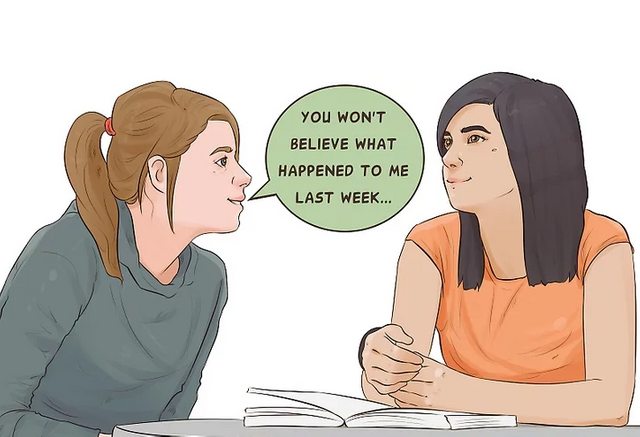
4. Find inspiration from stories you've heard.
Always be on the lookout for stories your friends or family members have told you that will be great works of fiction. If mom or grandma always tells their childhood to you, start writing it down. Just imagine how it feels to grow in a different age or place and begin to write down the possibilities. Do not delay if you do not really know the time frame; You can always do your research.
- When one of your friends says, "You will not believe what happened to me last week ...", pay attention. You can have the beginning of a short story from there.
- Stories can come from unexpected places. Maybe the radio DJ remembers his childhood in just a few sentences, and you suddenly feel fascinated with how likely his life is.
- Just be careful: if you get a reputable writer who "steals" stories people tell and use them for works of fiction, then people may be more hesitant to be open to you.

5. Look for inspiration from a setting.
A story can come from a very condensed atmosphere. You do not need to get inspired from the stirring beaches or your amazing holiday to Venice. Instead, get inspired from the usual. Think of what it would be like to spend every summer in your grandmother's apple garden as a child; remember how it feels to gather in the warehouse house of your friend used to be in high school.
- Write about places where you can develop interesting and conflicting characters.
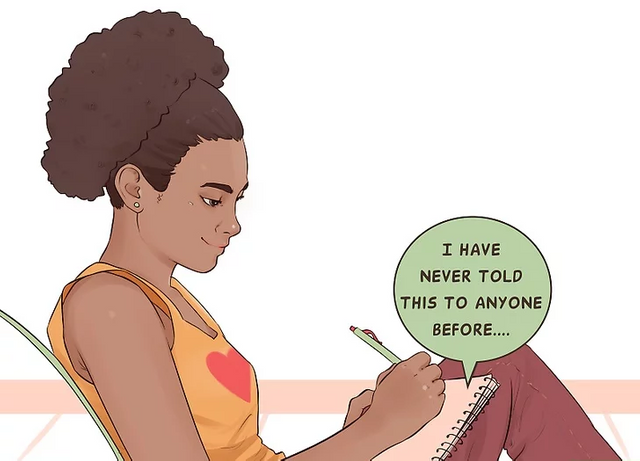
6. Seek inspiration from writing exercises.
The writing exercise has helped many authors develop their creativity, find inspiration in unexpected places, and force themselves to write when they feel as if they have "no idea." You can start with a daily write-up exercise just for 10-15 minutes to deliver your thoughts, or even write for an hour based on the exercise even if you do not feel inspired at all.
Here are some exercises to write nice to get yourself started:
- Begin the story with the following opening sentence: "I have never told this to anyone before."
- Look at a picture of a common warehouse in a field. Then, explain from the point of view of someone who has just committed a murder. Do this again from the point of view of a girl who just lost her mother. See how the character's mind can affect the way he sees the world.
- Write for 10-15 minutes non-stop. Do not stop or look back at what you have written until it's done.
- Choose someone in your life that you really hate. Now, try to write the story from the viewpoint of the person. Try to make the reader sympathize with him as much as possible.
- Let a figure startle you. Write about figures you seem to know quite well, and then let this guy do something that really makes you careless. See where this will take you
- Argument. Have two characters arguing about something completely ordinary, like who is going to take out the garbage, or who will pay to watch this movie. Explain that this argument is really about something bigger and more serious, like who will end the relationship, or who has given too much and not get anything in return. Try letting the dialog flow itself.
- Body language. Write 500 words that describe two figures who sit next to each other. Without using dialogue, let the reader see exactly how the two characters feel about each other.

7. Find inspiration by reading short stories
If you want to master short stories, then you have to read as many short stories as you can. You should read both classical and contemporary masterpieces, and use other people's writings to inspire you to write some short stories of your own.
Method 2 Improving the Ability to Write Stories

1. Take the authorship course.
The writing course is one of the great ways to learn the techniques of writing books and stories. Look for courses that prioritize public authorship or appropriate areas of interest to you. You can learn various themes in story writing, from children's books to magazine articles.
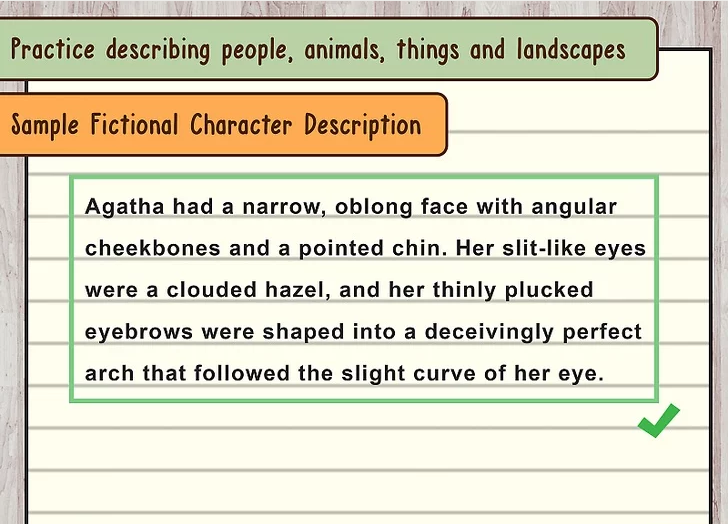
2. Practice describing people, animals, objects, and scenery.
In addition, practice conveying emotions, feelings, and reactions. A good writer is able to describe all of them in a creative way. Try by practicing describing the objects around you.
*For example, suppose you have a curtain. What does the curtain look like? What do you remember when you saw it? Where is the curtain in the room?
*However, do not be too descriptive when describing something because it can hamper the story line. Try to portray it realistically in the reader's mind.
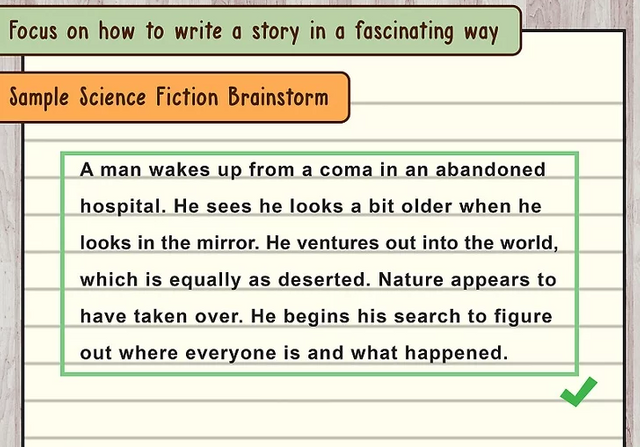
3. Focus on writing stories in an interesting way.
No one likes to read stories that are unattractive or not curious. Use unique words. Open a dictionary and find a word that appeals to you. Or, listen to your favorite shows. Make an interesting story for people to keep reading it. The goal is to attract readership and make them want to continue.
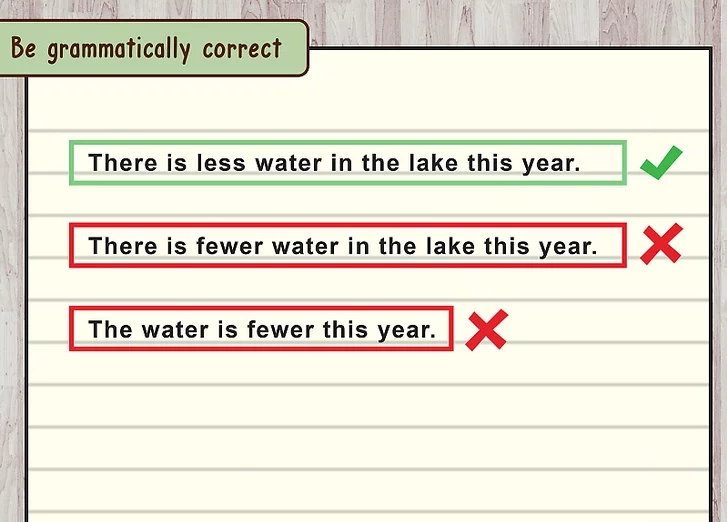
4. Use correct grammar.
Make sure readers can understand what you write. Writing down the "stuff" may make your readers confused. When writing a book, you may need to use standard words and avoid using incorrect spellings. However, if the character in the story does say the word "diboeat", write the word in quotation marks and follow the way of talking and thinking your character consistently.
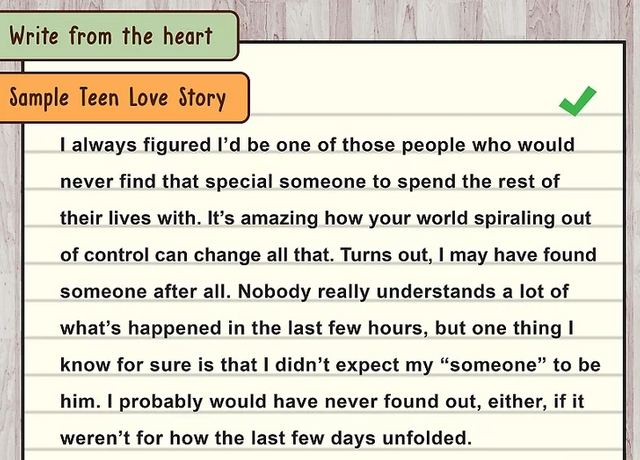
5. Write it from the heart.
If writing is the thing that you really like, share this by immersing yourself in the story. Write the story you like and think is good. Learn to write from the heart.
Accept constructive criticism and know when you need to improve writing skills. In addition, distinguish between criticism and envy. You will be able to understand it by practicing.
Method 3 Developing Stories
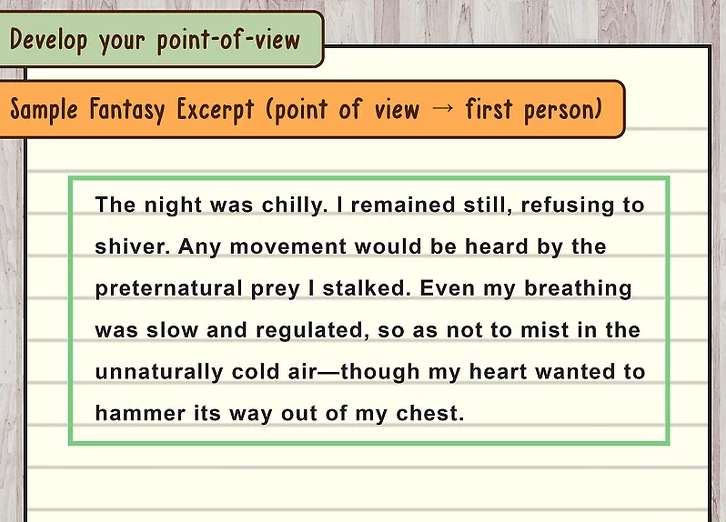
1. Develop a story angle.
Most of the short stories are written in the perspective of the first, second, or third person. If you start, you have to stick to one point of view. Here are three points of view and how to use them:
- First person. This first person is told directly from the perspective of a character who uses "I" to refer to him. "I've never told this to anyone before," is an example of writing the first person. The first person is great if you want to stay close to the thoughts and perspectives of the character, but can be limited if the perspective of the character is too limited. The first person is probably the easiest perspective to use if you're just getting started.
- The second person. The second person speaks directly to the reader as "you." As in the phrase, "You walk into your office." This can be a great technique for reaching readers, but it can be a bit overwhelming.
- The third person. The third person is when you write about a character by using "him" from an outside perspective, like saying, "She's tired." As a third person, the writer can approach the thoughts of the characters or get further away from the characters.
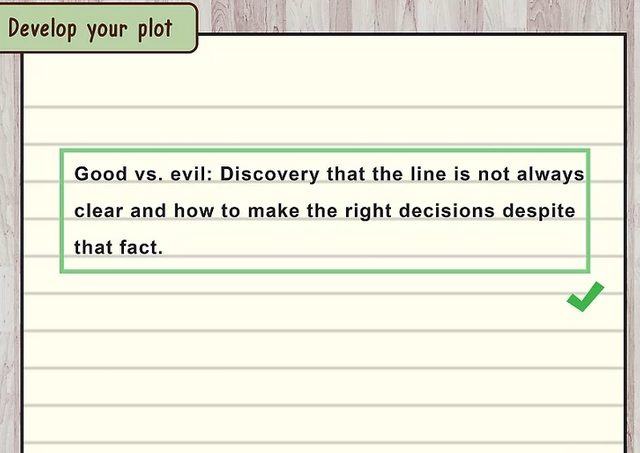
2. Develop a storyline.
Each short story should have a storyline that ties the reader, directing it to ask what will happen next. This does not mean that your story should include high-speed chase or murder scenes; your readers can wonder what will happen next even though what happens is just two people talking over coffee. Although each short story is different, here are some basic elements of a short story:
- Increased action / exposition: this usually comes at the beginning of a short story, when the reader is introduced to the main character, setting, and main conflict. However, some stories start right in the middle of the action and make readers scramble backwards to find out what really happened.
- Redemption action: the resolution of the story. Once the conflict is resolved or discussed, the story must be completed. But most short stories do not have a happy ending that is neat, or even tipped at that point. Many stories end in a word or picture that hangs the reader's thinking. If the story is neatly "wrapped" at the end, then you have removed some of the mysteries and appeal.
- Conflict: the stakes are stories. There must be something at stake in every story, otherwise the reader will not want to continue reading, no matter how beautiful the language is. Each story requires conflict or tension; can be as dramatic as two people scrambling for the same woman, or girls wondering if her friend would invite her to a party. The nature of the conflict is unimportant - what matters is that the reader should be concerned with what happens.
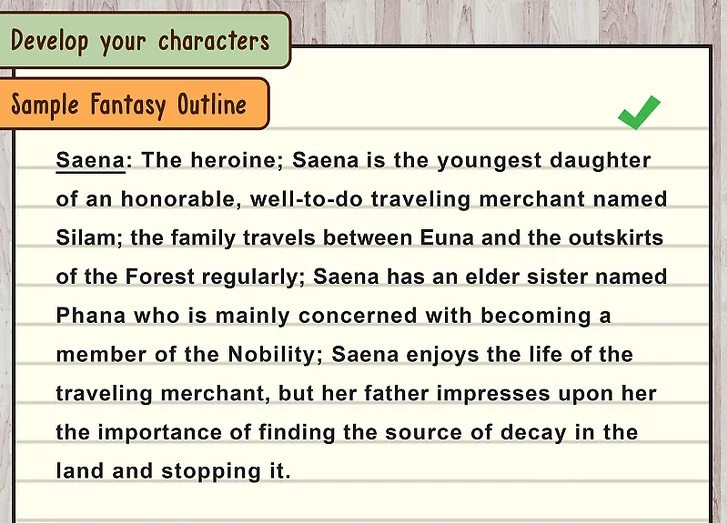
3. Develop story characters.
Your story must have a figure or some figures that your reader will have to care about and care for, even if the person is not an honorable person nor a good-hearted person. You can characterize your character through a number of different ways and they are all valid. Here are some ways to give your readers a strong impression on your character:
- Explain what they say. The perfect line of dialogue can explain the intentions of this character - especially if the dialogue does not match what he or she thinks.
- Explain what they do. Does the figure wake up at six every morning without an alarm, or does he spend hours hitting the "snooze" button before he wakes up? Any small action can help build a character, but at first it seems insignificant
- Describe her appearance. Does the character wear a very neat dress when he goes to the supermarket, or smiles his ruthlessness in a moment of profound sadness? Physical appearance of a figure can explain his mental state.
- Explain how they interact with others. Is your character incredibly shy, or prefers to rule until everyone around him is afraid to open his mouth? Is he good to the servants because his mother is a servant, or he is being annoying to all the servants because a servant ever broke his heart, or just because he likes it like that? Seeing a character acting in the world can reveal many things about him.
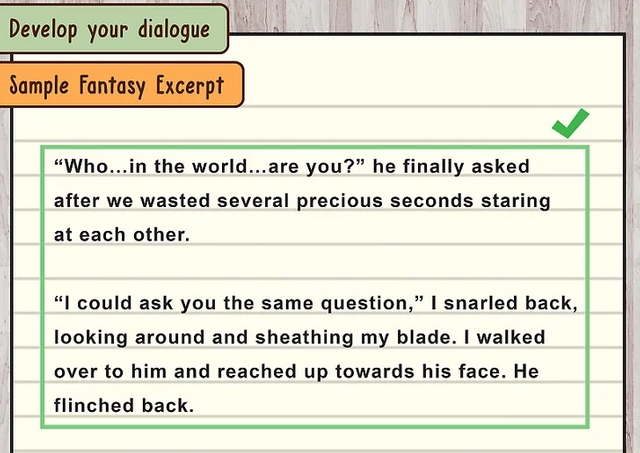
4. Develop dialogue in stories.
The dialog marks the words the character says, which are usually placed inside quotation marks. Dialogue can reveal many things about the good character of the things that the character says and the things he chooses not to say. You have to find a dialog that sounds as if it can be spoken by a real person, not sounding too wired or forced. Read your dialogue out loud to see if it really sounds like something someone might say.
- Dialogue between two characters can also reveal many things about the dynamics.
- Notice what is not said as well. For example, if a child is angry his father loses in a baseball game, if he does not mention the game at all when they next meet and instead say, "How does the father work today?" it can reveal many things about him.
- Avoid giving your dialogue annoying tags, like, "Mary says ..." instead of "Mary said ..."
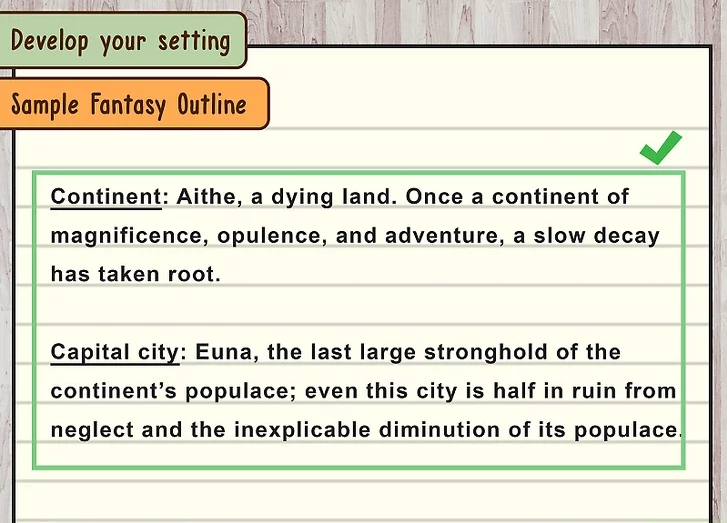
5. Develop a background story.
Short story backgrounds can be very important or can be very little to do with the events revealed. If your story is set in an ordinary house that has nothing to do with the story, then it's fine. But if the mistress of a character breaks into the house he lives with his wife, then every little detail is important, because it can explain the character's relationship with his wife - and what her mistress thinks about it. Decide how you should care about the setting and develop it in such a way.
- Even if the setting is not so important to the story, avoid confusing the reader and let him know where the scene is, even if it's just a cattle ranch town in Illinois, or a high school somewhere.
- The time period can be considered as part of the background. If your story is set in 1960, give your readers enough clues, or say it directly, so that he does not spend half the story thinking it happens in the present
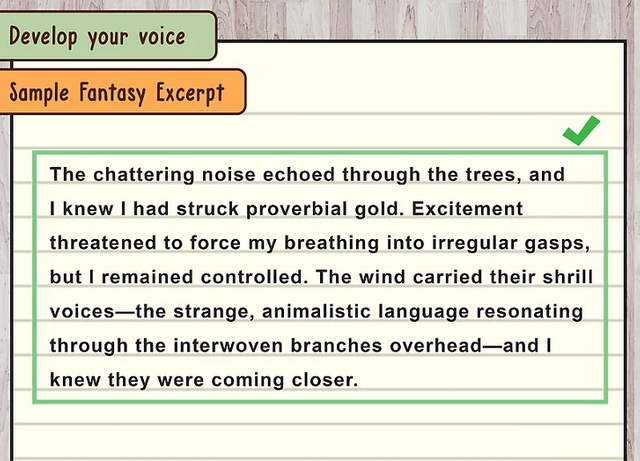
6. Develop a story sound.
In literature, sound is a unique way of writing words that indicate that the work can only be written by you. Your words must have their own habits, rhythms, and rhythms and no one can imitate them. Initially, it was natural for short story writers to try to imitate their favorite short story writers. But as you move forward as a short story writer, you have to find a unique way to express thoughts and ideas.
- Sound describes how the sound of the author sounds, not just how to speak his voice figure. Every word that is poured in a short story contributes to the author's voice.
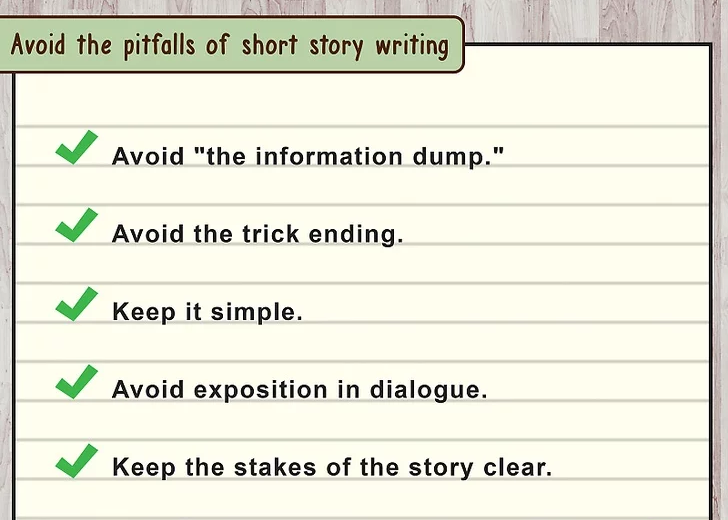
7. Avoid writing short story traps.
Although there are some guidelines, there is no firm and definite rule about the element that makes a short story good and what makes a short story bad. However, you can increase your chances of writing a successful short story by avoiding some of the common mistakes made by short story writers. Here are some things to think about as you move forward with short stories:
- Avoid "disclosing information." Do not tell the readers everything you think you need to know is right when the story begins. If you spend three pages explaining each character and every action before something actually happens, your readers will get tired.
- Avoid trapping endings. No one likes to read stories ultimately know that it's all a dream, or that it's all told from the alien's point of view from the start. O. Henry is famous for the end of his story, but now it is considered a cliche.
- Keep it simple. You may think that using flowers, high-flowered language to write short stories is the right way. If you're writing a story about upper-class life in an ornate castle, then this can be your best bet, but for most concepts, it's best to keep it short and simple.
- Avoid exposition in dialogue. Narrative, non-dialogue, should tell your readers basic information about the story. Dialogues should be used to provide more information about the characters and their struggles and relationships, but do not provide the "facts" of the story. For example, the character does not have to say, "Sam, even if you're twenty years old and this is your second year at Harvard ..." because this is something that both figures already know.
- Keep the book stakes clear. Every reader should be able to answer "What is at stake?" when and after reading your story. If the reader finishes reading the story and still does not know what is at stake, then the story has failed.
Method 4 Review Stories

1. Set aside briefly and then come back again.
Give your story a break - even if it's only for a day. Then, read with a new perspective, and try to see it as a reader not as a writer. As a reader, which sentence do you feel is unnecessary or confusing? What facts will you need more to know? Point in the storyline that is too clear or too complicated? Reading your own work with a fresh perspective can provide a fresh perspective on what needs to be changed.
- Sometimes by printing a story you have written in a Word document alone can help you view it from a new perspective.
- If you really want to improve the story but are really confused, try to set aside for a month or two. You'll be surprised at how much insight you'll get during this period.
- Setting aside your work for a while is a good move, but do not get sidetracked until you lose interest in it.

2. Ask for suggestions from others.
If you're ready to launch your story into the wide world, you can share it with close friends, fellow writers, a language teacher, or even a group of coauthors. Make sure you do not ask for opinions about the story before it is fully completed, otherwise you can feel stifled by criticism. Joining a writing workshop with like-minded people who are seriously committed to writing well can help you gain a new perspective on your own work.
- In order for the suggestion to be helpful, you must accept it. If you think you've written the most perfect story in the world, you will not really hear people's words.
- Make sure you give your story to the right readers. If you are writing science fiction, but submit your story to a friend of your writer who has never actually read science fiction before, then you may not get the best feedback.
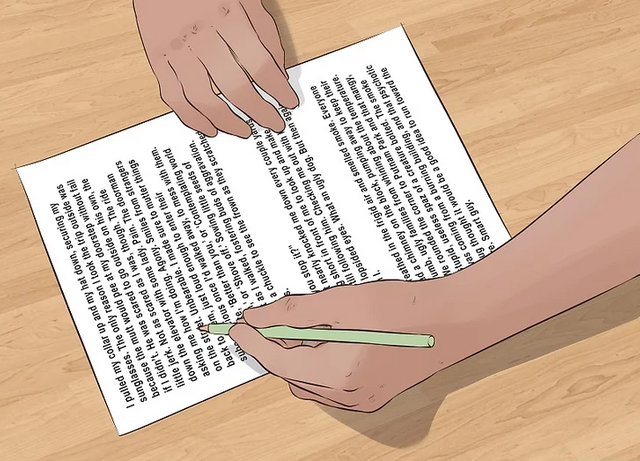
3. Revised stories use a variety of tricks.
There are many different ways to revise the story, and it all depends on what the first draft of your story is and how much work left can still be done. Many stories can require ten or more drafts to be exact, so do not be discouraged if you feel like you have to change everything in your story. When you revise your work, here are some things to think about:
- The need to change the point of view. You may think your story should be in the first person, but on a re-reading, you may see that a third person would be better for the story you want to convey.
- The need to change the point of view. You may think your story should be in the first person, but on a re-reading, you may see that a third person would be better for the story you want to convey.
- Reduce confusion. Ask yourself if you really will understand what is going on if you are not the author of the story itself. Maybe the concept of the story is very clear to you, but your readers can get really confused.
- Make sure you include feelings, sounds, etc. Feelings make life story. After all, what would be a story without feeling?
- Do more research if needed. If you're writing a story set in the West Village in New York City in the 60's and feel that you do not really know as you thought before, do some research on this period, it's time to pick up books to learn to taste to write a convincing story about this era.
- Do not give up easily. When you feel frustrated, remind yourself that there is never a first draft of a very good story - but if you write second, third, and even fourth draft, you have the potential to write amazing short stories.
Its a great piece of information on writing, but i still feel there should be good number of people to read it isnt it ?
Downvoting a post can decrease pending rewards and make it less visible. Common reasons:
Submit
I agree with you, I hope the article I discussed is useful for readers
Downvoting a post can decrease pending rewards and make it less visible. Common reasons:
Submit